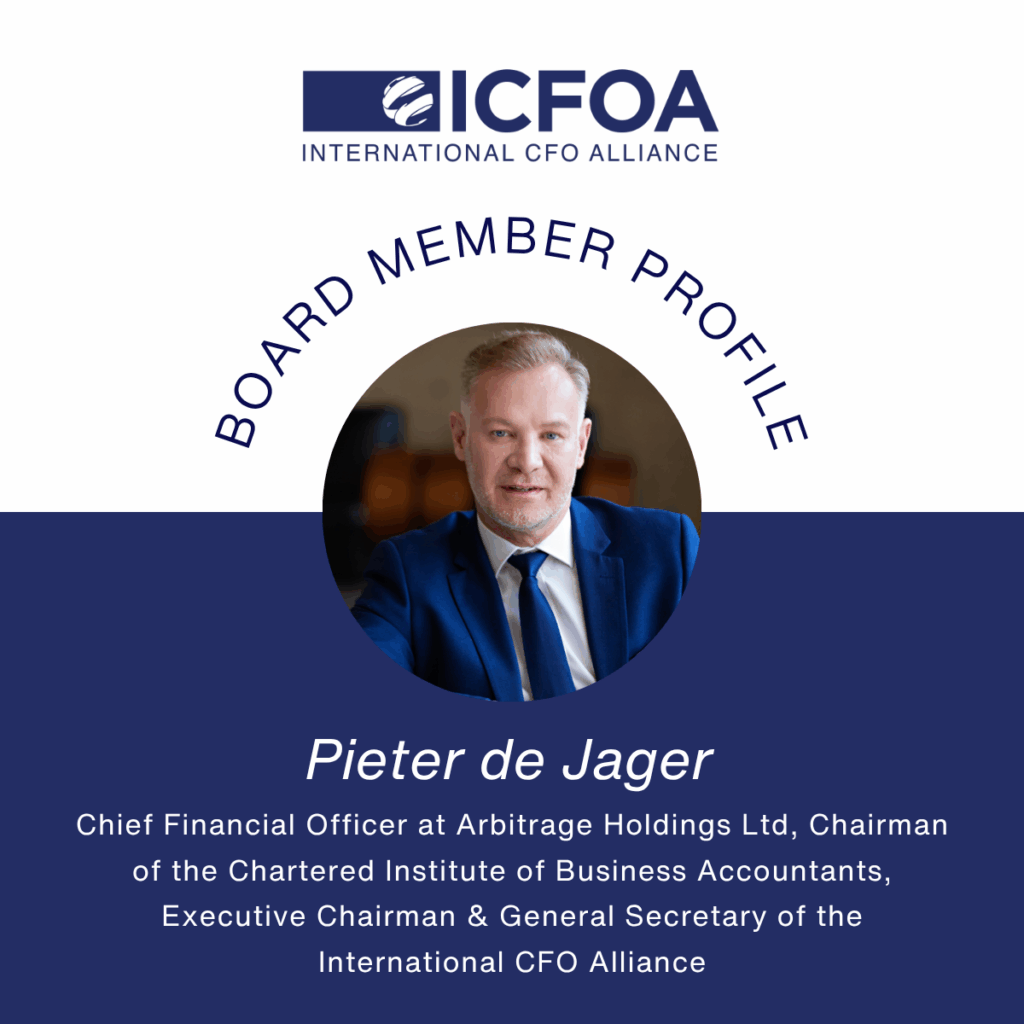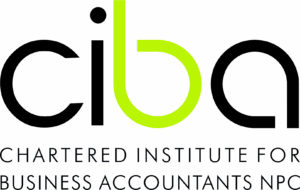
Pieter de Jager is a distinguished CFO and board director whose career spans multiple continents and industries, marked by strategic leadership and a commitment to financial excellence. A Certified Financial Officer (SA), Pieter currently serves as CFO and board director of Arbitrage Holdings Limited, a diversified mining and energy company. He also holds influential roles as Chairman of the Chartered Institute of Business Accountants (CIBA) in Southern Africa and Executive Chairman and General Secretary of the International CFO Alliance (ICFOA), which represents associations in more than 22 countries.
Pieter’s journey includes high-impact leadership roles across four major stock exchanges: JSE, TSX, ASX, and DSE. This exposure has given him unparalleled insight into global capital markets. His ability to navigate complex regulatory and governance environments across these jurisdictions speaks to both his expertise and adaptability.
From steering financial strategy in challenging contexts such as the DRC, Uganda, and Tanzania to executing transformative cross-border mergers and acquisitions and reverse listings in the African mining, logistics, and industrial sectors, Pieter brings a depth of experience that few can match. These efforts have delivered substantial shareholder value and strengthened organisational resilience.
At ICFOA, Pieter’s leadership reflects more than ceremonial presence. It underscores a vision for elevating the role of CFOs as strategic stewards of future economies, fostering global collaboration and professional excellence in finance.


What inspired you to pursue a career in finance or business leadership?
From early on, I was drawn not just to numbers but to the story they tell about people, companies, and strategy. Finance is the lens through which an organisation sees itself clearly — where ambition meets accountability. As I progressed in my career, I found great satisfaction in helping businesses not only stay solvent but thrive through disciplined capital strategy, turnaround planning, and international expansion.
I’ve also been inspired by complexity. Whether in South Africa, the DRC, or on the TSX or JSE, I’ve consistently chosen roles where the stakes were high and the operating environments were challenging. It’s in those spaces that finance becomes more than reporting — it becomes leadership.
Who has been your biggest influence or mentor, and what did you learn from them?
I’ve had the privilege of working alongside many high-calibre executives, but one figure who stands out is Sir Sam E. Jonah, former President of AngloGold Ashanti and later Executive Chairman at Jonah Capital. His global vision, calm under pressure, and conviction in African potential left a lasting impression.
From him, I learned that leadership requires both decisiveness and diplomacy — especially in environments shaped by uncertainty. He modelled how to think long-term in a world obsessed with short-term gains, and how to build coalitions across borders and cultures.
What’s one life lesson or philosophy you live by, whether in work or life?
One principle I live by is this: “Do the right thing — especially when it’s difficult.” In the boardroom, in the business operations and in life, integrity isn’t tested when things are easy; it’s revealed in how we act under pressure.
In my career, I’ve had to make hard calls — re-aligning mergers & acquisitions with shareholder value, restructuring teams across countries, or standing firm on governance in politically sensitive regions. These decisions weren’t always popular, but they were necessary. Trust, once lost, is hard to regain — and I’ve found that principle-driven leadership always yields the highest returns over time.
What’s a book, quote, or concept that changed how you think?
One that has stayed with me is this quote by Warren Buffett:
“It takes 20 years to build a reputation and five minutes to ruin it. If you think about that, you’ll do things differently.”
That idea sharpened my view of reputation as an asset — one that doesn’t appear on a balance sheet, but underpins every number on it. As a CFO, I often advocate for decisions that protect not just financial value, but trust value: the confidence of investors, regulators, customers, suppliers and employees.
On a broader scale, the concept of systems thinking — viewing organisations not in silos, but as interconnected ecosystems — has shaped my approach to transformation. It’s how I’ve led finance functions through digitalisation, governance reform, and M&A strategies in a way that’s sustainable.
Outside of finance, what are your hobbies or interests that people might not expect?
I try to make time to reflect and relax with family and friends with my active outdoor hobbies which include skiing, scuba diving, golfing and squash.
Please briefly describe your current role and responsibilities in your organisation.
I am currently the CFO and Board Director of Arbitrage Holdings Limited. I also serve as the Chairman of the Chartered Institute of Business Accountants in Southern Africa as well as being the Executive Chairman & General Secretary of the International CFO Alliance which comprises of member associations from more than 22 countries.
What are some milestones or achievements in your career that you’re particularly proud of?
There are several, but a few stand out because of their strategic complexity and long-term impact:
Serving as CFO and Board Director across four stock exchanges — JSE, TSX, ASX, and DSE — allowed me to engage in global capital markets at the highest level. Navigating the regulatory, governance, and stakeholder expectations across jurisdictions was both challenging and rewarding.
Leading financial strategy for companies in difficult operating environments such as the DRC, Uganda, and Tanzania. Turning around performance in these markets required not only financial acumen, but resilience, cultural intelligence, and sound governance structures.
Playing a pivotal role in cross-border M&A and reverse listings — particularly in African mining, logistics, and industrial sectors. These transactions required sharp valuation skills and deep negotiation experience, and many of them delivered real shareholder value.
Being elected as Executive Chairman & General Secretary of the ICFOA and serving as Independent Chairperson of CIBA. These are not just ceremonial roles — they reflect a deep commitment to building a professional ecosystem where CFOs are recognised not only as finance leaders, but as strategic stewards of the future economy.
What professional designation(s) or qualifications do you hold, and which one challenged you most?
I hold several professional designations and academic qualifications that each shaped my approach to leadership:
B.Comm (University of Pretoria – UP)
B.Compt (Hons)/CTA (University of South Africa – UNISA)
MBA (GIBS/UP) with a thesis on cross-border M&A and the impact on shareholder value
CFO(SA) – Chartered Institute of Business Accountants
PA(SA) – South African Institute of Professional Accountants
CPA(T) – Certified Public Accountant (Tanzania)
Fellow Member of the Institute of Directors (SA)
The most demanding was arguably the MBA, not only because of its academic rigour, but because I completed it mid-career while juggling executive responsibilities. The exposure to global strategy, M&A dynamics, and advanced negotiation sharpened my thinking and expanded my ability to engage with boards and investors on a more strategic level.
Each designation, however, has deepened my ability to deliver value — not just in terms of numbers, but in guiding companies through transformation, growth, and ethical leadership.
If you could give one piece of advice to a young finance professional starting out today, what would it be?
Don’t chase the title — chase the impact.
Too many young professionals focus solely on upward mobility without developing a clear understanding of how value is created in an organisation. Learn to think beyond the spreadsheet — ask why the numbers matter, how they drive decisions, and who is affected by them.
Also, build cross-functional understanding early — operations, tech, strategy — because the best finance leaders are business leaders first, accountants second.
Why did you get involved with ICFOA?
I saw a critical need for a global, yet inclusive, community of CFOs — one that went beyond national institutes or commercial forums. The finance profession is undergoing a profound transformation, and senior leaders need a space to share, standardise, and elevate best practices across borders.
ICFOA brings together voices from over 22 countries, fostering not only technical dialogue, but ethical and strategic collaboration. I wanted to help shape that — not as a passive member, but as a hands-on builder of a stronger profession.
What do you hope ICFOA will accomplish in the next five years?
I see ICFOA achieving three key outcomes:
Establishing a globally recognised CFO Charter or Code of Conduct — to elevate ethical, strategic, and sustainability standards for CFOs worldwide.
Creating knowledge pathways between Global North and Global South finance leaders — including mentorship programmes, co-authored research, and shared policy engagement.
Becoming the go-to platform for global finance thought leadership — not only for CFOs, but for governments, academia, and institutions seeking practical insight on navigating financial complexity in a fast-changing world.
What role do you believe CFOs should play in solving global challenges (e.g. climate, inequality, digitalisation)?
CFOs can no longer be back-office guardians of compliance. Today, they are central to allocating capital with conscience.
From decarbonisation to digital inclusion, the way capital is invested and measured determines whether progress is real or performative. CFOs are uniquely positioned to link sustainability goals with financial reality — through integrated reporting, risk modelling, and long-term planning.
We must move from simply reporting ESG to redefining enterprise value around it.
How do you see ICFOA bridging the gap between Global North and Global South CFOs?
By creating a shared table, not a two-tier system. The Global South brings not only talent but also innovation — particularly in resource-constrained environments where creative solutions are born out of necessity.
The ICFOA acts as a translator and connector — ensuring that frameworks, standards, and opportunities are not just exported from the North, but co-created through dialogue. Whether it’s helping a CFO in Nairobi adopt digital finance tools, or introducing inclusive governance models from Johannesburg to Paris and Milan — this is the power of a true alliance.
What is one idea, project, or initiative you’d like to see ICFOA launch?
I would love to see the ICFOA successfully develop and issue an International Professional CFO Designation
Additionally it would be groundbreaking to launch a Global CFO Exchange Fellowship — a structured initiative that enables mid- to senior-level finance professionals to work, mentor, or shadow peers in another region or sector for a short term.
This kind of hands-on cross-border exposure would deepen practical knowledge, enhance cultural intelligence, and build an authentic pipeline of global finance leadership. Imagine a CFO from São Paulo learning digital cash flow tools from Singapore, or one from Paris exchanging ESG strategies with Dar es Salaam — that’s how we bridge not only skill gaps but perspective gaps.
It would also help create a new generation of CFOs who are globally fluent and locally grounded.
Coffee or tea?
Only the best Coffee, without a doubt!
Excel or PowerPoint?
Excel, it’s an occupational addiction!
Books or podcasts?
Both. I like reading to relax, but enjoy podcasts when I stuck in gridlocked traffic.
Early bird or night owl?
Night owl, the only time I can get to concentrate without daily operational distractions
If you weren’t in finance, what would you be doing?
I might have found myself in education technology, helping build future leaders by grounding them in ethics, systems thinking, and outcome-based global competence.
